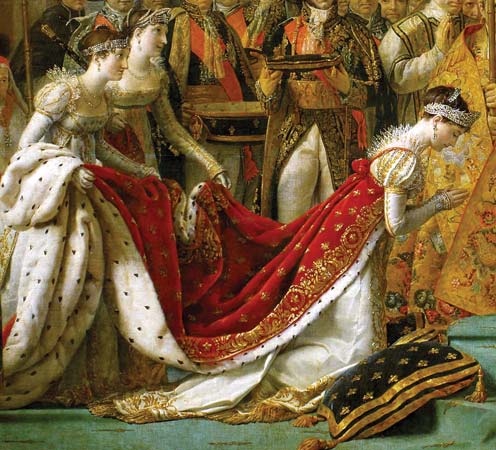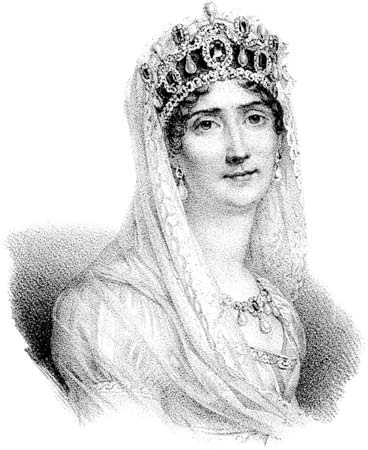Joséphine
empress of France
original name Marie-Josèphe-Rose Tascher de La Pagerie, also called (1779–96) Vicomtesse (viscountess) de Beauharnais, or (1796–1804) Joséphine Bonaparte
born June 23, 1763, Trois-Îlets, Martinique
died May 29, 1814, Malmaison, Fr.
 consort of Napoleon Bonaparte (Napoleon I) and empress of the French.
consort of Napoleon Bonaparte (Napoleon I) and empress of the French. Joséphine, the eldest daughter of Joseph Tascher de La Pagerie, an impoverished aristocrat who had a commission in the navy, lived the first 15 years of her life on the island of Martinique. In 1779 she married a rich young army officer, Alexandre, vicomte de Beauharnais (Beauharnais, Alexandre, Viscount de), and moved to Paris. Although she bore him two children, Hortense and Eugène, the vain Alexandre was ashamed of her provincial manners and lack of sophistication and declined to present her at the court of Marie-Antoinette at Versailles; his indifference grew so great that in March 1785 she obtained a separation. She remained in Paris three years, learning the ways of the fashionable world, and went back to Martinique in 1788. In 1790 a slave uprising on the island forced her to return to Paris, which was then in the throes of the Revolution. She frequented high society, but her life was endangered when her husband, who had been serving in the Revolutionary army, fell out of favour with the left-wing Jacobins and was guillotined in June 1794. Joséphine herself was imprisoned; but after the coup d'état of 9 Thermidor (July 27) put an end to the Terror, she was released and by the time of the inauguration of the Directory was a leader of Paris society.
Joséphine, the eldest daughter of Joseph Tascher de La Pagerie, an impoverished aristocrat who had a commission in the navy, lived the first 15 years of her life on the island of Martinique. In 1779 she married a rich young army officer, Alexandre, vicomte de Beauharnais (Beauharnais, Alexandre, Viscount de), and moved to Paris. Although she bore him two children, Hortense and Eugène, the vain Alexandre was ashamed of her provincial manners and lack of sophistication and declined to present her at the court of Marie-Antoinette at Versailles; his indifference grew so great that in March 1785 she obtained a separation. She remained in Paris three years, learning the ways of the fashionable world, and went back to Martinique in 1788. In 1790 a slave uprising on the island forced her to return to Paris, which was then in the throes of the Revolution. She frequented high society, but her life was endangered when her husband, who had been serving in the Revolutionary army, fell out of favour with the left-wing Jacobins and was guillotined in June 1794. Joséphine herself was imprisoned; but after the coup d'état of 9 Thermidor (July 27) put an end to the Terror, she was released and by the time of the inauguration of the Directory was a leader of Paris society.No longer unsophisticated, Joséphine was able to catch the fancy of Bonaparte, then a rising young army officer. She agreed to marry him after he had been appointed commander of the Italian expedition. Married in a civil ceremony on March 9, 1796, Joséphine was an indifferent wife, declining to answer the future emperor's passionate love letters and, while he was campaigning in Egypt in 1798–99, flirting with another army officer in a most compromising manner. Bonaparte threatened to divorce her, but her children dissuaded him, and he eventually forgave her, even agreeing to pay the enormous debts she had accumulated. During the Consulate (1799–1804) she was careful to cause no more scandals and used her social position to advance her husband's political fortunes. After Napoleon became emperor of the French in May 1804, she persuaded him to marry her anew with religious rites; the ceremony, which the Emperor arranged most reluctantly, took place on Dec. 1, 1804. The following day she attended Napoleon's coronation by the Pope in Notre-Dame as empress.
Joséphine's place in the world now seemed secure. The marriages of her children Hortense (to Napoleon's brother Louis) and Eugène (to the daughter of the King of Bavaria) seemed to establish her position; but her extravagance and, above all, her inability to give Napoleon a son put a strain on their marriage. Hoping to make a politically convenient marriage with Marie-Louise, daughter of Emperor Francis I of Austria, Napoleon in January 1810 arranged for the nullification of his 1804 marriage on the grounds that a parish priest had not been present at the ceremony. This slight technical irregularity, which seems to have been premeditated, enabled him to dispose of Joséphine without having to resort to a divorce, which would have displeased both the church and the Austrian emperor.
Joséphine retreated to her private residence at Malmaison, outside Paris, where she continued to entertain lavishly, with the Emperor paying the bills. After Napoleon's abdication she won the protection of the Russian emperor Alexander I but died soon after.
- Kent, William
- Kenya
- Kenya African National Union
- Kenya, flag of
- Kenyah
- Kenya, Mount
- Kenyatta, Jomo
- Kenyon College
- Kenyon Cox
- Kenyon, Dame Kathleen
- Keohane, Nannerl Overholser
- Keokuk
- Keonjhar
- Keorapetse Kgositsile
- Kepes, Gyorgy
- Kepler
- Keplerian telescope
- Kepler, Johannes
- Kepler's laws of planetary motion
- Kepler's Nova
- Keppel, Augustus Keppel, Viscount, Baron Elden
- Keppel Bay
- Keppler, Joseph
- Ker
- Kerala